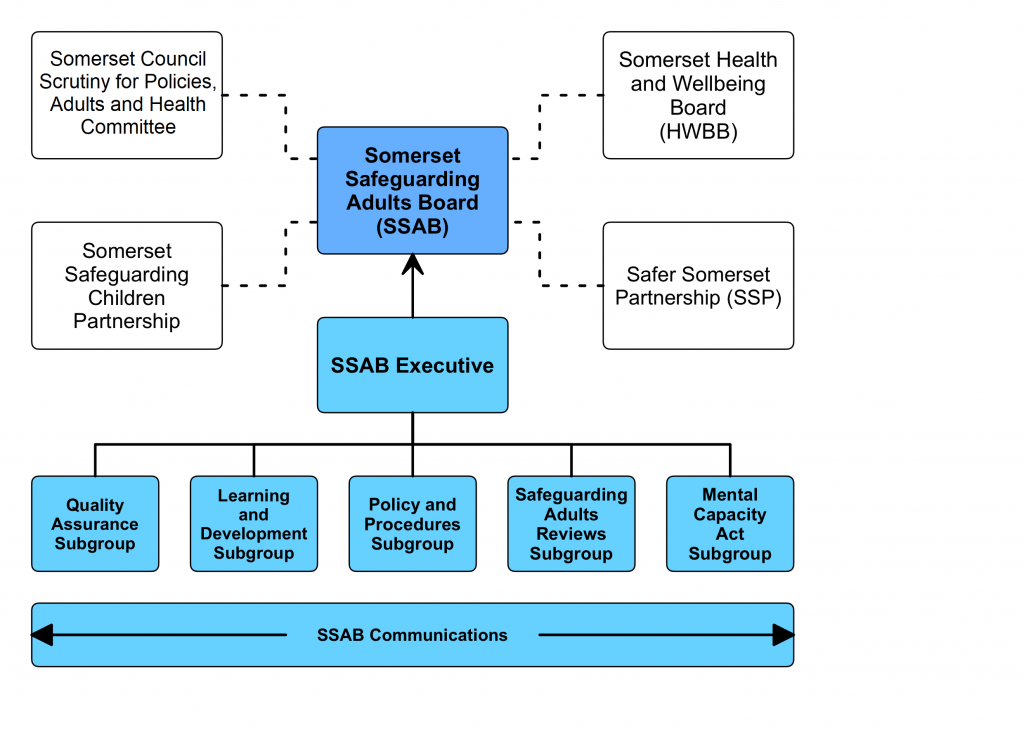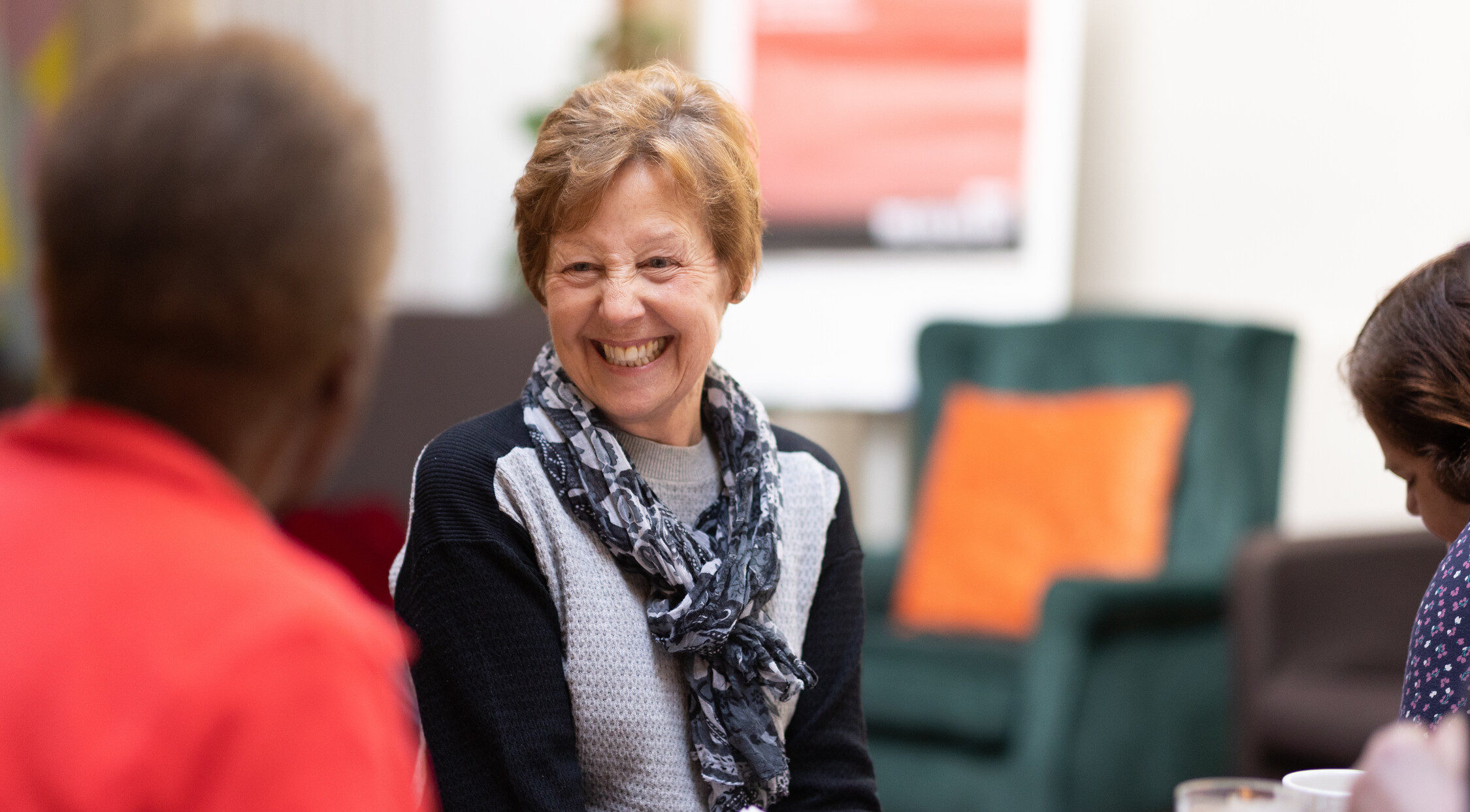Our structure and governance
The Safeguarding Adults Board meets on a quarterly basis and is supported by an executive group and a number of multi-agency subgroups, which meets regularly to progress the ambitions and strategic priorities of the board.
The primary purpose of the subgroups are set out below: Learning and Development Subgroup: to provide a multi-agency perspective of safeguarding adults’ training, learning and development needs, and ensure lessons are learnt and used to inform policy or procedures.
Learning and Development Subgroup: to provide a multi-agency perspective of safeguarding adults’ training, learning and development needs, and ensure lessons are learnt and used to inform policy or procedures.
Policy and Procedures Subgroup: to produce, maintain, develop and review policy, procedures and guidance to improve outcomes for adults at risk in Somerset.
Quality Assurance Subgroup: to establish and maintain performance arrangements for the Board, and quality assure local practice.
Safeguarding Adults Review Subgroup: to ensure the Board meets its statutory requirements in relation to commissioning Safeguarding Adults Reviews.
Mental Capacity Act Subgroup: to develop and monitor guidance and best practice in relation to the Act and associated legislation and guidance.
Effectiveness survey
Somerset’s Safeguarding Adults Board has long undertaken regular review of its effectiveness and performance as part of a wider quality assurance programme. This takes the form of a ‘effectiveness survey’ seeking the views, opinions and feedback of its members against a number of key statements.
The statements within the survey reflect those outlined within a national Adult Safeguarding Improvement Tool, developed in partnership by the Association of Chief Police Officers, the Association of Directors of Adult Social Services, the Local Government Association, the NHS Confederation, and NHS Clinical Commissioners: Adult Safeguarding Improvement Tool – Local Government Association
This outlines the characteristics of well-performing and ambitious partnerships and is recommended as a means of self-assessment as well as being used in peer reviews and challenge.
Results from the survey assist the Board in benchmarking its current performance, identifying both key strengths and any areas requiring our further focus and attention. It provides us with the level of people’s understanding and experience of the Board’s activity, impact and progress over the past year – this is invaluable evidence to support the Board’s internal and external assurance activity, including the focus of the Care Quality Commission’s new assessment framework for local authorities which will also explore the work of SABs in ‘ensuring safety’.
Somerset’s latest effectiveness survey was conducted in January 2024 and saw confidence levels improve across all 12 Effectiveness statements when comparing survey results to those taken 12 months ago in early 2023. We have added a new question relating to compliance with statutory duties.
Pleasingly, there is consensus from our members in the areas that require our ongoing further focus and attention which supports our strategic planning:
| % Agreed or Strongly Agreed 2024 | % Agreed or Strongly Agreed 2023 | |
|---|---|---|
| % Agreed or Strongly Agreed 2024100% | % Agreed or Strongly Agreed 2023 71% | |
| % Agreed or Strongly Agreed 202479% | % Agreed or Strongly Agreed 2023 53% | |
| % Agreed or Strongly Agreed 202474% | % Agreed or Strongly Agreed 2023 65% | |
| % Agreed or Strongly Agreed 202495% | % Agreed or Strongly Agreed 2023 59% | |
| % Agreed or Strongly Agreed 202489% | % Agreed or Strongly Agreed 2023 53% | |
| % Agreed or Strongly Agreed 202484% | % Agreed or Strongly Agreed 2023 65% | |
| % Agreed or Strongly Agreed 202489% | % Agreed or Strongly Agreed 2023 65% | |
| % Agreed or Strongly Agreed 202474% | % Agreed or Strongly Agreed 2023 29% | |
| % Agreed or Strongly Agreed 202474% | % Agreed or Strongly Agreed 2023 76% | |
| % Agreed or Strongly Agreed 202447% | % Agreed or Strongly Agreed 2023 41% | |
| % Agreed or Strongly Agreed 202463% | % Agreed or Strongly Agreed 2023 47% | |
| % Agreed or Strongly Agreed 202495% | % Agreed or Strongly Agreed 2023 94% | |
| % Agreed or Strongly Agreed 2024100% | % Agreed or Strongly Agreed 2023 N/A |
Strengths and opportunities
Examples of some of the key strengths and opportunities that our members highlighted in 2024.
Identified strengths
- The board has moved on significantly with new independent chair who brings a wealth of experience and knowledge.
- Positive working relationships, and willingness and enthusiasm to work together to improve Safeguarding related work within Somerset by key agencies.
- Collaboration between sub-group members, which enables productive outcomes regarding policy and practice guidance. The interface between the sub-groups and SSAB now appears to work well with a culture of working together as opposed to seemingly operating as separate entities.
- A very good Chair with extensive knowledge brings a lot to the table. An effective Business Manager and good support at the Board.
- Increasing commitment to the Board and its work; a clearer and mutually agreed strategic plan informed by the lived experience of practitioners and managers.
- Our Independent Chair who comes with significant energy, knowledge and experience and has helped direct the Board forward and achieve positive results after his first year in office.
- SSAB communications – well established
- Regular newsletter or X (twitter) that is well received and regarded
- Webinars and training opportunities being progressed
- Conferences
- Cross-regional engagement
- A relaunched SSAB website
- Effective and efficient business manager who balances the many demands of the Board and subgroups despite no wider business support
- Networks and recruitment from members
- Policy and Procedures: Detailed, clear, extensive across a range of key areas and linked with region as appropriate
- a string NHS sub-group chair in this space
- Strong evidence of scrutiny in relation to quality and performance reporting each quarter (standing board agenda item) informing clear recommendations for action
- Food focus on Making Safeguarding Personal within the Local Authority Safeguarding Service performance and approach.
Identified opportunities for improvement
- Having the voice of lived experience evidenced in all we do and everything we develop as moving forwards.
- When learning reviews take place extremely rich learning come from them and is shared well. However there has been a substantial delay in the undertaking of the reviews making some of the learning out of date, or not coming out in a timely way.
- Continued public awareness raising. Possibly more clarity regarding roles, responsibilities and reporting mechanisms (or if these are already in place, clarity on where to find the information).
- More evidence of how we listen to the lived experience voice to help shape the future.
- Increasing commitment to the Board and its work; a clearer and mutually agreed strategic plan informed by the lived experience of practitioners and managers.
- Co-production and meaningful engagement with the public and those with direct experience of safeguarding, and ensuring our info is accessible and engaging
- Continuing to ensure robust embedding of learning from Safeguarding adults reviews across our system
- Maintaining readiness for Care Quality Commission assessment contributions
- More focus and support for younger adults (those with learning disabilities or mental health) and the safety of transitions.

